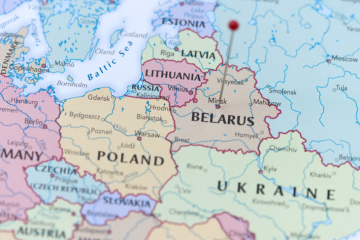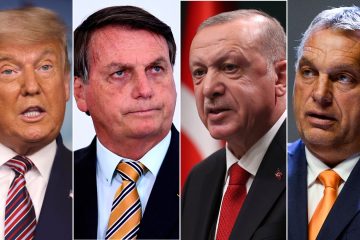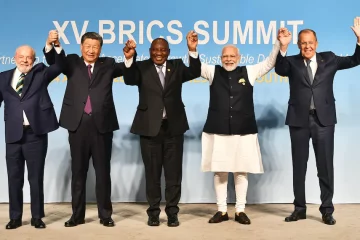
Variable Geometry: What Washington is Getting Wrong
The new buzzword echoing through the halls of the White House is variable geometry. Faced with a panoply of transnational threats, the Biden administration is building fit-for-purpose coalitions between countries and other stakeholders, including local governments, the private sector, NGOs, and academia. Coalitions have been formed to address discrete policy challenges, including COVID-19, food security, providing aid to displaced Ukrainians, and most recently, synthetic opioids. In times of polycrisis, variable geometry suggests that the “America First” policy is no longer viable. Yet, the diplomatic currency of the United States remains zero-sum; official statements about defending the liberal world order continue to echo the end of history thesis, without accounting for the growing demands of middle powers – particularly those in …

Wrong Analytical Lenses Undermine the West’s Belarus Policy
Belarus, a country of 9.2 million people in Eastern Europe, is portrayed in Western media and diplomatic circles in a simplistic and unnuanced way: in addition to its decades-long description as Europe’s last dictatorship, it is now also perceived as a Russian satellite state, springboard for hybrid threats, including illegal migration, to the EU, and a co-aggressor in Moscow’s war on Ukraine. Such perceptions particularly dominate the discourses and shape the policies towards Belarus of its immediate neighbours among EU and NATO member states – Poland, Lithuania, and Latvia. Indeed, tensions on Belarus’s borders with these states have risen sharply in recent years. Since 2020, Warsaw, Vilnius, and Riga have spearheaded the introduction of harsh Western sanctions and border closures, …

Identity Capital and the North-South Gap in Explaining Populism
The literature on populism in the 21st century often assumes that far-right leaders draw their support from voters who have lost out to globalisation. This is the case among low-skilled, white workers in Global North democracies, including the United States. But, there are also meaningful occurrences of backlash against the political establishment and liberal values in parts of the Global South that have clearly benefited from the post-Cold War trade openness. For instance, two of the largest democracies in the developing world have been shaken by right-wing movements that came to power with the support of the winners of economic liberalisation. In Brazil, Jair Bolsonaro, a former army captain, won the presidency in 2018 with the support of agribusiness exporters …

From BRICS to BRICS+: Implications for the Group, Multilateralism, and the Global South
Introduction After World War II, the multilateral system was designed to promote international peace, drive economic growth, and ensure global cooperation. Institutions such as the United Nations, International Monetary Fund, and World Trade Organisation established alliances, treaties, and agreements with the aim of achieving shared prosperity. In recent years, however, cracks are beginning to appear within this system. The world has witnessed a sharp increase in geopolitical crises like the Russia – Ukraine war, withdrawals from treaties, trade protectionism and back-sliding democracies. The multilateral system has also failed to deliver comprehensive solutions to global issues such as COVID-19 and climate change. As the inequalities within the multilateral system become increasingly apparent, calls for change are starting to reverberate across the …

Geopolitical challenges hamper Rohingya repatriation from Bangladesh
The Rohingya refugee crisis as a trigger for displacement For decades, the Rohingya, a predominantly Muslim ethnic group in Myanmar, have sought refuge in neighbouring Bangladesh to escape persecution. This influx, particularly since 2015, has strained Bangladesh’s limited resources. The persecution of the Rohingya is a textbook case of ethnic cleansing by Myanmar’s civilian-military government. With around one million Rohingya refugees in Bangladesh, concerns have been raised about the safety of the host population . Despite intense diplomatic efforts, Myanmar, governed by a military junta since 2021, remains reluctant to repatriate its Rohingya nationals, causing frustration in Bangladesh. Previous repatriation attempts in 2018 and 2019 failed due to the Rohingya refugees’ fear of violence upon return. In Rakhine State, where …

Breaking the Domino Effect: How the West Should Respond to Niger’s Coup
On 26 July, Niger’s presidential guard launched a coup against President Mohamed Bazoum, announcing their seizure of power in a televised broadcast. As the dust of the coup begins to settle, Niger — and the international community — stand at a crossroads. The military junta’s success in maintaining power is far from guaranteed and has been widely condemned. Several states and supranational organisations, including the US, France, the EU, the Economic Community of West African States (ECOWAS), and the African Union (AU) have threatened the military junta with sanctions if it does not reinstate President Bazoum, and have even considered military intervention. However, the Sahel’s track record of successful coups suggests that Niger is likely to see further democratic backsliding, …

Russia’s War in Ukraine and Women’s Agency
Despite the unabated destruction and devastation caused by Russia’s full-scale invasion of Ukraine, the war also opened new doors for development and a leap in women’s agency. Ukraine is fundamentally rethinking gender roles, expanding the opportunities of its citizens, and serving as a model for other countries. The Armed Forces of Ukraine have become the first place where women’s voices have been amplified. Ukraine has allowed women to participate in military operations to guarantee national security and defence, as they repel and deter armed aggression by Russia. Currently, 40,000 women serve in the Armed Forces, including those in combat roles. Furthermore, 8,000 women hold officer positions, and 5,000 serve on the front lines. In the near future, a separate combat …

Review of Sehenden Auges: Mut zum Strategischen Kurswechsel (With Eyes Wide Open: The Courage for a Strategic Course Change) by Dr. Stefanie Babst
Just over a year after Russia’s invasion of Ukraine in February 2022, Dr. Stefanie Babst, who has held several senior positions at NATO, including heading its Strategic Foresight Team from 2012 to 2020, has published her latest book, Sehenden Auges: Mut zum Strategischen Kurswechsel (With Eyes Wide Open: The Courage for a Strategic Course Change). The book is an important call for critical reflection and course correction among NATO partners and a plea for the West to continue to support Ukraine, not least in its own interests. The first part of the book contextualises Russia’s war on Ukraine. The author explains Putin’s rise to power, the workings of his power apparatus, and Moscow’s strategic objectives. Babst provides the reader with …









